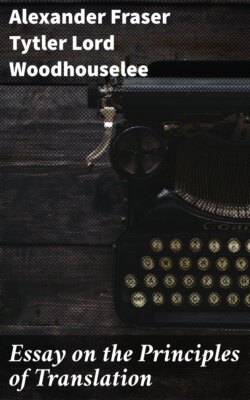Читать книгу Essay on the Principles of Translation - Alexander Fraser Tytler Lord Woodhouselee - Страница 5
INTRODUCTION
ОглавлениеThere is perhaps no department of literature which has been less the object of cultivation, than the Art of Translating. Even among the ancients, who seem to have had a very just idea of its importance, and who have accordingly ranked it among the most useful branches of literary education, we meet with no attempt to unfold the principles of this art, or to reduce it to rules. In the works of Quinctilian, of Cicero, and of the Younger Pliny, we find many passages which prove that these authors had made translation their peculiar study; and, conscious themselves of its utility, they have strongly recommended the practice of it, as essential towards the formation both of a good writer and an accomplished orator.[1] But it is much to be regretted, that they who were so eminently well qualified to furnish instruction in the art itself, have contributed little more to its advancement than by some general recommendations of its importance. If indeed time had spared to us any complete or finished specimens of translation from the hand of those great masters, it had been some compensation for the want of actual precepts, to have been able to have deduced them ourselves from those exquisite models. But of ancient translations the fragments that remain are so inconsiderable, and so much mutilated, that we can scarcely derive from them any advantage.[2]
To the moderns the art of translation is of greater importance than it was to the ancients, in the same proportion that the great mass of ancient and of modern literature, accumulated up to the present times, bears to the general stock of learning in the most enlightened periods of antiquity. But it is a singular consideration, that under the daily experience of the advantages of good translations, in opening to us all the stores of ancient knowledge, and creating a free intercourse of science and of literature between all modern nations, there should have been so little done towards the improvement of the art itself, by investigating its laws, or unfolding its principles. Unless a very short essay, published by M. D’Alembert, in his Mélanges de Litterature, d’Histoire, &c. as introductory to his translations of some pieces of Tacitus, and some remarks on translation by the Abbé Batteux, in his Principes de la Litterature, I have met with nothing that has been written professedly upon the subject.[3] The observations of M. D’Alembert, though extremely judicious, are too general to be considered as rules, or even principles of the art; and the remarks of the Abbé Batteux are employed chiefly on what may be termed the Philosophy of Grammar, and seem to have for their principal object the ascertainment of the analogy that one language bears to another, or the pointing out of those circumstances of construction and arrangement in which languages either agree with, or differ from each other.[4]
While such has been our ignorance of the principles of this art, it is not at all wonderful, that amidst the numberless translations which every day appear, both of the works of the ancients and moderns, there should be so few that are possessed of real merit. The utility of translations is universally felt, and therefore there is a continual demand for them. But this very circumstance has thrown the practice of translation into mean and mercenary hands. It is a profession which, it is generally believed, may be exercised with a very small portion of genius or abilities.[5] “It seems to me,” says Dryden, “that the true reason why we have so few versions that are tolerable, is, because there are so few who have all the talents requisite for translation, and that there is so little praise and small encouragement for so considerable a part of learning” (Pref. to Ovid’s Epistles).
It must be owned, at the same time, that there have been, and that there are men of genius among the moderns who have vindicated the dignity of this art so ill-appreciated, and who have furnished us with excellent translations, both of the ancient classics, and of the productions of foreign writers of our own and of former ages. These works lay open a great field of useful criticism; and from them it is certainly possible to draw the principles of that art which has never yet been methodised, and to establish its rules and precepts. Towards this purpose, even the worst translations would have their utility, as in such a critical exercise, it would be equally necessary to illustrate defects as to exemplify perfections.
An attempt of this kind forms the subject of the following Essay, in which the Author solicits indulgence, both for the imperfections of his treatise, and perhaps for some errors of opinion. His apology for the first, is, that he does not pretend to exhaust the subject, or to treat it in all its amplitude, but only to point out the general principles of the art; and for the last, that in matters where the ultimate appeal is to Taste, it is almost impossible to be secure of the solidity of our opinions, when the criterion of their truth is so very uncertain.
